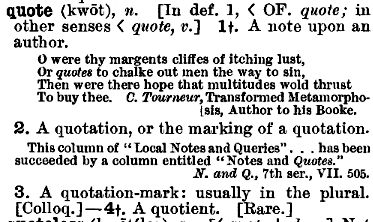February 08, 2007
"If only language could be 'fixed'"
 Dick Cavett's maiden "Talk Show" post over at the NYT has now racked up 573 comments. This wouldn't be worth noting at one of the popular political sites like Daily Kos or Little Green Footballs, but for a blog behind the Times Select wall, it's a lot. In comparison, Stanley Fish's long blog essay on presidential signing statements, posted a week earlier and still featured today on the index page at nytimes.com, has a mere 55 comments so far.
Dick Cavett's maiden "Talk Show" post over at the NYT has now racked up 573 comments. This wouldn't be worth noting at one of the popular political sites like Daily Kos or Little Green Footballs, but for a blog behind the Times Select wall, it's a lot. In comparison, Stanley Fish's long blog essay on presidential signing statements, posted a week earlier and still featured today on the index page at nytimes.com, has a mere 55 comments so far.
This is another sign of the American public's pent-up enthusiasm for the analysis of language, though in this case, we're seeing the peevish rather than the playful side of this passion.
Some of Cavett's commenters are simply a form of applause:
#5 Oh thank you, Mr. Cavett! I love this column.
#10 Thank you! Thank you! This was like manna from heaven.
#28 A wonderful comment on a woeful truth. This should be required reading for everyone.
#30 Amen.
#98 Thank you. Thank you. Thank you.
A few comments hint at that understudied pathology, language masochism:
#68 Am eternally grateful when someone corrects me.
#70 Brilliant! I am afraid to write more lest I receive an edited response by the author of this great piece.
#443 Well you have gone and done it, shattering my confidence in my ability to speak English. Thanks because apparently I needed the reminder.
#498 I am so thankful that you are around to protect our language in your inimitable entertaining way. (Boy, I hope I didn’t screw up that sentence).
#516 Please sir, may I have another?
OK, I fabricated #516. Several contributors do hint that their word rage has its roots in abusive family life, e.g. #73:
great article. my favorite movie scene is from the first adams family movie. as they are plumeting to their death in an elevator they decide to correct one anothers grammer. this sums up my childhood quite nicely.
But most of the commenters just want to register their own "pet peeves". Some use exactly that over-used phrase:
#8 Terrific article, but what about my pet peeve: media as a singular noun! Example: Radio = communications medium. TV and newspapers = communications media.
#14 My pet peeves: “I feel badly that he lost his job” or, “There’s three great actors in this film” and, “There’s less soldiers in Baghdad than we need”.
#44 My pet peeve is the confusion of “good” and “well” especially among sports figures.
#101 This is the most unique article I’ve read on language, and now you know one of my pet peeves.
#121 My pet peeve is the much used “less taxes” as applied to reducing the amount of money we pay the government. It’s either “fewer taxes” as in a smaller number of things being taxed by the government, OR “less tax” meaning less money paid as tax(es).
#122 One of my pet peeves is “bacteria” used as a singular, when the singular is bacterium.
Others find somewhat less ritualistic ways to express their irritation:
#2 The flight attendant item reminds me of another favorite: We will be flying into Philadelphia. Ouch. Not even funny anymore, I suppose. Related would be: He turned himself into the police. Presto, change-o.
#6 a mis-usage that I see constantly is confusion between “discreet” and “discrete” — usually the latter word meant to describe the former definition.
#9 And what of “tenent” - almost daily now - for tenet? Does he merely rent a position rather than hold it? “Different than” continues to grate though it has long since passed into the vernacular - or should that now be vernaclear?
#17 Would you please explain, sometime, to your (often learned) compatriots that “this data” should be “these data” if they actually want to sound “learned” ?
There's a sample of touching testimonials from people who see an elevated style as a way to move up socially, but haven't quite gotten it right:
#22 It is only reasonable to expect the language of any area to change when that area has a high influx of immigrates, even if they share the same language. However, one hopes that those persons who claim to have higher educations would put into practice what one assumes they came into contact with while there. But then again, apparently what they came into contact with was less than one would expect from the Ivy League Institutions. Some how I find this self-satisfactory since I lacked both the finances and the bloodline to attend any of those pristine colleges/universities and yet I am less of a ‘Language Slacker’.
#27 By the way, only one of my older relatives even graduated from high school, and only one (who dropped out of high school) graduated from college, which happened to be West Point. Yet all of them valued the English language more highly than our president and his cohorts do.
#34 Thank you sir for making the NYT the source for educational material. From the editors to the beat writers to the opinion makers, the paper’s staff excell in providing readers something worth reading. Keep up the good work. And please keep hammering the unchecked war promoters with your cutting remarks.
#355 First I would like to express how as a young girl your talk show was very much a thing to watch. Now I’m 53 years old and seem I take more a interest now we have the Internet to post comments as such here to your blog.
English is more than just a language to me. And as you express in this blog it is to you too and reading comments to those out there in society too.
Several commenters jumped on Cavett for using quote as a noun in the sentence "A good example is the great but frequently wounded quote of Mark Twain’s on writing, a quote that causes, when done right, my forearms to horripilate."
#53 Surely you distinguish between the verb “[to] quote” and the noun “quotation”. Or are the post-Webster’s Second dictionaries letting us down here as well?
#272 To quote is a verb; the noun is quotation.
#438 Realize that I’m being picky, but I would prefer that even you refer to quotations as “quotations” rather than “quotes.”
#572 Quotation. Quote is the verb, quotation is the noun. I found that error fairly entertaining in an article complaining about abuses of English. That said, I am in complete agreement with the author.
No one objected to the awkward placement of the when-clause or the prissily pretentious "horripilate".
As usual, the valiant defenders of the language are a bit vague about the facts of the language they cherish, which in this case include the fact that quote as a noun has been in the OED for some time, with citations like this one from T.S. Eliot writing to Ezra Pound in 1922:
Do you mean not use the Conrad quote or simply not put Conrad's name to it?
And the Century dictionary of 1891 has

That quote is from Cyril Tourneur's poem "The Author to his Booke", published in 1600, which starts:
1 O were thy margents, cliffes of itching lust;
2 Or quotes to chalke out men the way to sinne;
3 Then were there hope, that multitudes wold thrust
4 To buy thee: but sith that thou dost beginne
5 To pull the curtaines backe, that closde vice in;
6 Expect but flowts: for t'is the haire of crime,
7 To shunne the breath that doth discloude it sinne.
In fairness, Tourneur means quote in the obsolete sense of a marginal reference or note, whence the wonderful image of the margins of a printed page as "cliffs of itching lust". Still, quote, the noun, was around long before Webster's Third was begun.
Moving from careless crankiness to preposterous pseudo-pedantry, #489 is worried about the preposition at the end of Cavett's essay ("It’s only language. It’s only what we live by."):
#489 Very Funny! What I find most intriguing, however, is how he ended the piece with: “It’s only what we live by.” I wonder if he meant to end the sentence with a preposition…? I sure hope so after writing an entire column about the proper use of language!
Some some other comments are even funnier:
#177 the sniveling snools of academentia are surely clucking over this mordant piece. if only language could be “fixed” in both senses of the word — sam’l johnson would be resting easy.
"Fixed" is a word with many senses -- the OED gives 11 -- but I immediately thought of the one that means "desexed". As the Winnipeg Humane Society explains:
After being fixed, your pet will be less aggressive toward other dogs or cats, will be more affectionate towards you and will be less likely to wander.
And you'll avoid those pesky linguistic puppies and kittens as well!
My favorite comment:
#565 My, what a group of curmudgeons and old biddies.
Of course, I aspire to the status of curmudgeon myself.
Posted by Mark Liberman at February 8, 2007 08:11 AM